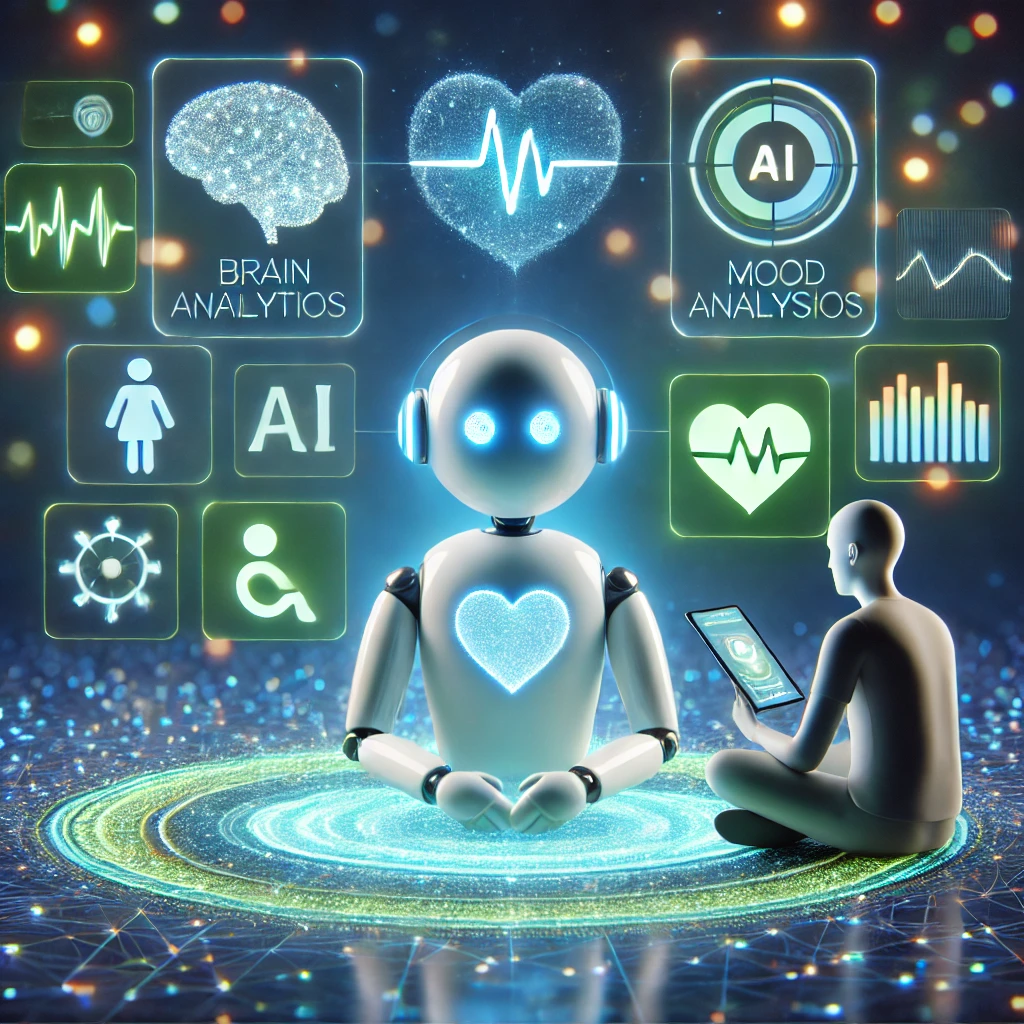Mental health significantly impacts overall well-being, yet access to mental health services often remains limited, stigmatized, or inadequate in addressing increasing needs. Artificial Intelligence (AI) is proving to be a revolutionary tool by offering scalable, personalized, and accessible mental health support. Leveraging machine learning, natural language processing, and predictive analytics, AI aids in diagnosing, treating, and even preventing mental health conditions.
Understanding AI in Mental Health
AI in the mental health domain includes a variety of tools and techniques, ranging from basic chatbots to advanced machine-learning algorithms that identify patterns in speech, behavior, and physiology. These tools can:
- Analyze extensive patient data to detect early signs of mental health concerns.
- Provide therapeutic interventions via virtual assistants.
- Offer real-time feedback to clinicians to aid in diagnosis and treatment.
- Enhance self-care and preventive measures through tailored recommendations.
AI’s capacity to process and scrutinize vast amounts of data enables it to identify behavioral patterns and psychological markers, making it an invaluable asset in mental healthcare.
Applications of AI in Mental Health
AI is already transforming mental health support in several crucial areas:
AI-Powered Chatbots and Virtual Therapists
Chatbots like Woebot, Wysa, and Replika engage users in dialogues to support issues such as anxiety, depression, and stress. These AI-based virtual therapists employ cognitive behavioral techniques and empathetic responses to mimic a conversation with a real therapist. They are available 24/7, providing valuable assistance to those who cannot access traditional therapy.
Diagnostic Tools for Early Detection
AI algorithms can analyze voice tone, word choice, facial expressions, and typing speed to detect potential mental health conditions. For example, AI can help identify signs of depression or bipolar disorder by analyzing changes in speech or written language. Early detection facilitates timely intervention, potentially preventing the escalation of mental health issues.
Remote Monitoring and Predictive Analytics
AI applications continually monitor physiological data such as heart rate variability, sleep patterns, and movement, which are essential for understanding the interplay between physical and mental health. An AI-enabled device could alert a patient or their healthcare provider if significant deviations in heart rate or sleep patterns are detected, signaling heightened anxiety or depressive symptoms.
AI in Personalized Therapy and Self-Care
Machine learning algorithms can create personalized self-care plans based on user responses, behavior, and preferences. This individualized approach enhances the effectiveness of mental health support, as users receive recommendations tailored specifically to their needs. AI-driven platforms like Youper provide customized mental health exercises and mindfulness practices based on the user’s mood or emotional state.
Suicide Prevention and Crisis Intervention
AI tools analyze social media posts, text messages, and search history to identify individuals at risk of self-harm or suicide. By recognizing distress-related language patterns, AI systems can alert family, friends, or mental health professionals, enabling proactive intervention. Organizations like Crisis Text Line use machine learning to prioritize and assist high-risk individuals, potentially saving lives.
Advantages of AI for Mental Health
Integrating AI into mental healthcare offers several major benefits:
Accessibility and Affordability
AI-driven applications provide round-the-clock support and are often more affordable than traditional therapy.
Support for Remote and Barriered Individuals
For people living in remote locations or those who find it difficult to access mental health services, these AI tools can be a crucial source of help.
Continuous Support and Immediate Feedback
Unlike traditional mental health services, which often occur on a weekly or monthly schedule, AI offers constant support and real-time feedback. This allows individuals to get immediate help when they need it, thereby improving outcomes and helping them stick to their self-care routines.
Reducing Stigma
AI tools provide a private and judgment-free environment for seeking help, enabling individuals to avoid the stigma associated with mental health issues. This privacy can encourage those reluctant to approach a mental health professional to begin seeking care.
Data-Driven Insights for Providers
AI can quickly analyze vast amounts of data, uncovering trends and patterns that might be missed by clinicians. With these insights, healthcare providers can make more precise diagnoses and create more effective treatment plans.
Challenges in AI-Driven Mental Health Support
Despite its potential, AI-driven mental health support faces several challenges:
Privacy and Data Security
AI systems need access to sensitive personal data to be effective. Protecting this data and ensuring user privacy is crucial, especially with mental health information. Strong data protection measures are necessary to build trust and comply with regulations.
Risk of Misdiagnosis
AI algorithms are trained on data, which can sometimes introduce biases or inaccuracies. Misdiagnosis can occur if the AI does not fully understand a user’s unique background, potentially leading to ineffective treatment or harm.
Human Element and Emotional Nuance
AI chatbots and virtual therapists can simulate empathy to some extent but lack the human touch. Genuine emotional connections and nuanced understanding are vital in mental healthcare, and AI cannot fully replicate this.
Ethical Considerations
AI-driven mental health tools raise ethical issues, especially concerning consent and autonomy. Users need to be fully informed about the role of AI in their care and should have the option to choose human-centered care if they prefer.
Prominent AI Tools in Mental Health
Several AI-driven platforms are making significant progress in the mental health sector, offering various types of support:
Woebot
Woebot is an AI-driven chatbot that uses cognitive behavioral therapy (CBT) techniques. It interacts with users to help manage anxiety, stress, and depression through a friendly conversational approach.
Wysa
Wysa combines CBT, dialectical behavioral therapy (DBT), and other therapeutic techniques to offer emotional support and guided self-help exercises. It also provides access to human therapists for more personalized care.
X2AI
X2AI offers a range of AI-powered mental health chatbots designed for specific groups, including refugees, adolescents, and trauma survivors. These chatbots provide emotional support and crisis intervention.
Youper
Youper uses AI to deliver personalized therapeutic exercises based on users’ emotional states. It helps users manage their moods and emotions by tailoring exercises to their specific needs.
Ellie
Developed by USC’s Institute for Creative Technologies, Ellie is an AI-driven virtual therapist used for assessing conditions like PTSD and depression. It analyzes facial expressions, voice tone, and verbal responses to provide real-time assessments.
Future Directions for AI in Mental Health
As we see more technological advancements, AI is set to play a bigger role in mental health, offering more precise and efficient solutions:
Integration with Wearables and IoT
Future AI tools might connect with wearables such as smartwatches and fitness bands, gathering detailed information about a person’s physical health, activities, and other bodily indicators. Analyzing this data, AI could uncover links between physical and mental health, providing well-rounded advice.
AI-Enhanced Teletherapy
Virtual therapy platforms could use AI to support human therapists by suggesting treatment methods and tracking the progress of patients. This could make therapy sessions more efficient and ensure continuous care.
AI-Driven Group Support
AI-powered virtual support groups could connect people with similar experiences. AI could lead group discussions, watch over the participants’ well-being, and provide personalized support, boosting the benefits of community-based mental health care.
Predictive Analytics for Preventive Care
By examining past data, AI could pinpoint individuals who might be at risk for mental health problems and offer preventive resources before the situation worsens. This could change mental health care by emphasizing early action and prevention.
Conclusion
Artificial Intelligence holds great promise for transforming mental health care, making it more accessible, personalized, and data-driven. By enabling early detection, real-time support, and preventive care, AI could make mental health services more effective and inclusive. However, it is crucial to address issues related to privacy, ethics, and the human side of mental health care to fully harness AI’s potential in this sensitive area.
With continuous progress, AI could soon be a key part of mental health support systems globally, improving care for many and helping to tackle the mental health crisis worldwide. As we move forward, it will be vital to balance technological advancements with ethical considerations and human-focused care to create a future where AI and mental health work together effectively.







Leave a Reply